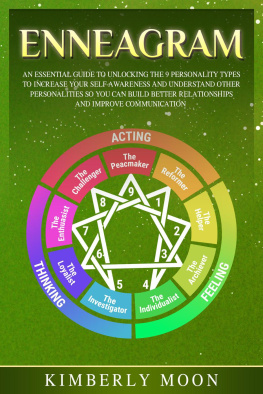Please
Understand
Me
II
Temperament
Character
Intelligence
David
Keirsey
Prometheus Nemesis Book Company 1998
All rights reserved under the International and Pan-American Copyright Conventions. No part of this book may be reproduced in any form or by any means, electronic or mechanical, including photocopying, without permission in writing from the publisher. All enquiries should be addressed to the publisher. Published in the United States by Prometheus Nemesis Book Company, Post Office Box 2748, Del Mar, CA 92014.
Forward
"The point of this book," writes my old friend David Keirsey, "is that people differ from each other, and that no amount of getting after them is going to change them." The point is also, David might have added, that the important differences between us are our natural birthright, arising in just a few distinctive patterns. Recognizing these patterns can vastly enrich our sense of who we are, of who others are, and of how much we can learn from one another about the problems of life. No person that I know of has studied temperament in action more persistently and more brilliantly than Keirsey, and no one is in a better position to speak to us about it. Keirsey has been "people watching" for almost fifty years, and his interest in temperament as an organizing principle stretches back almost as far. If Please Understand Me was a valuable report on his progress to that time (1978), Please Understand Me II serves to present a report on what he has worked out in the interim twenty years, and also the valuable addition of his ideas about the relationship of temperament to intelligence.
I have known David for almost thirty years now. During those years I have had the pleasure of teaching and writing and learning with him, and the even greater pleasure of arguing with him. Our time together has been filled with logical discourse and theoretical speculation, and, at the same time, good, old-fashioned hair-splitting debate (including the use of devious debate tactics and other trickery to see if we could catch the other napping). We are both Rationals, and as you read this book you will understand why we Rationals treasure collecting various skills, exercising ourselves with logical investigation, but also finding delight in argumentation, logical trickery, and (I confess) terrible jokes - as long as they are clever plays on words. You will also see, by the way, why non-Rationals will - each temperament for its own reasons - find what is so rewarding for us Rationals to be intolerable!
What I find remarkable about Keirsey's empirical investigations is which of the many problems in psychology he has chosen to Investigate - intelligence, madness, personality - each a very complex problem, and each with a checkered history. And I find his treatment of each unique. His theory of intelligence is like no other, nor is his theory of madness, nor is his theory of personality. Each is unique, true, but far more important, each is useful to practitioners, something that cannot be said, at any rate with much conviction, of any other extant theory of intelligence, or madness, or personality. From David's study of temperament I have learned that the great personal differences between me and those around me were not an indication that there was something wrong with me - or with them. I have learned that the apparent deficiencies in a person's characteristic ways of dealing with the world are offset by natural strengths in different areas. We don't require that a great painter be a wise teacher, nor that a trusted accountant be a brilliant physicist. We all, according to our temperament, have our areas of distinction and our areas of struggle. Both deserve to be respected for what they are. So it is with temperament: different temperaments naturally show us different patterns of intelligent behavior.
Perhaps most important, I have learned that we must not judge either ourselves or others harshly when our (or their) values, preferences, and style of experiencing and dealing with the world are different. There is room for us all, and a need for us all. I am grateful that David has decided to offer us Please Understand Me II , and I feel certain that its readers will be fascinated and pleased with it.
Ray Choiniere
Contents
Different
Drummers
If you do not want what I want, please try not to tell me that my want is wrong .
Or if my beliefs are different from yours, at least pause before you set out to correct them.
Or if my emotion seems less or more intense than yours, given the same circumstances, try not to ask me to feel other than I do.
Or if I act, or fail to act, in the manner of your design for action, please let me be.
I do not, for the moment at least, ask you to understand me. That will come only when you are willing to give up trying to change me into a copy of you.
If you will allow me any of my own wants, or emotions, or beliefs, or actions, then you open yourself to the possibility that some day these ways of mine might not seem so wrong, and might finally appear as right--for me. To put up with me is the first step to understanding me.
Not that you embrace my ways as right for you, but that you are no longer irritated or disappointed with me for my seeming waywardness. And one day, perhaps, in trying to understand me, you might come to prize my differences, and, far from seeking to change me, might preserve and even cherish those differences.
I may be your spouse, your parent, your offspring, your friend, your colleague. But whatever our relation, this I know: You and I are fundamentally different and both of us have to march to our own drummer.
As in the original Please Understand Me , the point of this updated and expanded edition is that people are different from each other, and that no amount of getting after them is going to change them. Nor is there any reason to change them, because the differences are probably good.
We differ from each other in fundamental ways. We differ in our thoughts, in our feelings, in our wants and beliefs, and in what we say and do. Differences are all around us and are not difficult to see, if we look. Unfortunately, these variations in action and attitude trigger in us an all-too-human response. Seeing others as different from ourselves, we often conclude that these differences are bad in some way, and that people are acting strangely because something is the matter with them.
Thus, we instinctively account for differences in others not as an expression of natural diversity, but in terms of flaw and affliction: others are different because they're sick, or stupid, or bad, or crazy.
And our job, at least with those we care about, is to correct these flaws, much as the mythical sculptor Pygmalion labored to shape his perfect woman in stone. Like Pygmalion, we labor to remake our companions in our own image. After all, are we not ourselves, even with our flaws, the best models for how humans should think, feel, speak, and act? Remember the line in My Fair Lady (based on Shaw's play Pygmalion ), when Henry Higgins wonders why Eliza Doolittle can't simply "be like me?"
But our Pygmalion Project cannot succeed. The task of sculpting others into our own likeness fails before it begins. Ask people to change their character, and you ask the impossible. Just as an acorn cannot grow into a pine tree, or a fox change into an owl, so we cannot trade our character for someone else's. Of course we can be pressured by others, but such pressure only binds and twists us. Remove a lion's fangs and behold a still fierce predator, not a docile pussycat. Insist that your child or your spouse be like you, and at best you'll see his or her struggles to comply--but beware of building resentment. Our attempts to reshape others may produce change, but the change is distortion rather than transformation.












